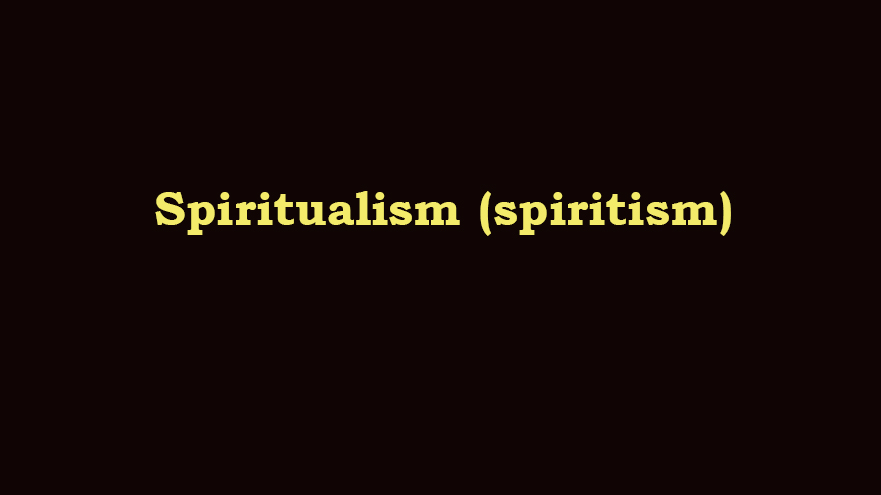
Spiritualism (spiritism)
It is worship of spirit beings. Its major belief is that the spirits of the dead can communicate to the living on the earth through mediums who are more sensitive to the messages from the spirit world. “Spiritism (or spiritualism) may be defined as the belief that it is possible to communicate with the spirits of the dead so as to receive from them intelligent messages. Spiritualism is the overt worship of spirit beings. “the essence of spiritualism is talking with or receiving information from beings who have departed this life. Communication with the beyond takes place at a séance. (Larson’s New Book on Cults, p.388-9)
We believe in infinite intelligence 2. We believe that the phenomena of nature both physical and spiritual are the expression of infinite intelligence 3. We affirm that a correct understanding of such expression and living in accordance therewith constitute true religion 4. We affirm that the existence and personal identity of the individual continues after the change called death 5. We affirm that communication with the so-called dead is a fact scientifically proven by the phenomena of spiritualism. 8. We affirm that the doorway to reformation is never closed against any human soul here or hereafter (Larson’s New Book on Cults, p.391).
Spiritualism (spiritism)
It is worship of spirit beings. Its major belief is that the spirits of the dead can communicate to the living on the earth through mediums who are more sensitive to the messages from the spirit world. Mediums have spirit guides (familiar spirits in biblical language) who control the medium during seances. Demonstration and proof of the continuity of life, coupled with the comforting assurance that the life is good. It is attractive to some because it confirms for them the life after death and also the reunion with their loved ones.
Definition
“Spiritism (or spiritualism) may be defined as the belief that it is possible to communicate with the spirits of the dead so as to receive from them intelligent messages and proofs of their identity and survival, and as the study and practice of so doing” (ERE vol 11. p. 805). “spiritualism is the science, philosophy and religion of continuous life based upon the demonstrated fact of communication by means of mediumship with those live in the spirit world. A spiritualist is one who believes, as the basis of his or her religion, in the communication between this and the spirit world by means of mediumship, and who endeavors to mold his or her character and conduct in accordance with the highest teachings derived from such communion” (National spiritualist Association, Definitions, 1914, 1919. quoted from Walter martin, The Kingdom of the Cults, Bethany House Publishers, Minneapolis, 1985. p. 240). “Spiritualism/spiritism may be mankind’s oldest religion. From the shamans of primitive cultures and the seers of ancient paganism to the psychics who frequent today’s TV talk shows, Spiritualism has an unbroken history in almost every culture. In the strictest sense of the term, spiritualism is the overt worship of spirit beings, exemplified by the voodoo practitioners of Haiti, macumba devotees in Brazil, and black magic advocates in Africa” (Larson’s New Book on Cults, p.386).
Nature
“As the time went on the phenomena of spiritism became very various. They are usually classified as psychical and physical. Under the psychical phenomena may be enumerated the various forms of automatism, of speech, of writing, of vision (e.g. crystal gazing), obsessions, impersonations, trances, apparitions, hallucinations, clairvoyance, clairaudience, hyperaesthesia, prophecy and the like. Any supernormal knowledge elicited by any method of communication or in any of these states, or in veridical dreaming, especially when yielding evidence of spirit identity, may also be claimed in favor of the spiritist interpretation. As physical phenomena there are said to occur in séances inexplicable movements of bodies (telekinesis), sounds, lights, direct spirit writing, the passage of solids through solids, as in the untying of knots, the materializations of human and other forms, the bringing in of objects from a distance (apports), levitations, spirit photographs, immunity from the effects of handling fire etc. In many cases however the question whether a phenomenon reported, e.g. a spirit-light or an apparition – is physical or psychical (i.e., hallucinatory) may be the very point to be decided, and if the evidence pointing to the occurrence of collective hallucinations is admitted, the ordinary criteria of physical reality rather break down” (ERE Vol. 11. p. 806). “the essence of spiritualism is talking with or receiving information from beings who have departed this life. Communication with the beyond takes place at a séance. Interested parties gather in a darkened setting, since the entities are said to be less likely to appear in the full gaze of either too much light or too many people, especially if some are non-believers. Ectoplasm, a foul-smelling, milky white substance that exudes as an ‘umbilical cord’ from the medium’s mouth, is said to be an energy form that will not function properly without darkness…the spirit guide, who generally is already known (familiar) to the medium, may control his subject’s mind or subject the medium to a trance state. The voice and personality of the medium then change as the spirit imposes his will and character upon his vehicle of communication…mediums usually specialize in a particular type of spiritistic phenomenon” (Larson’s New Book on Cults, p.388-9). It has its roots in eastern mysticism particularly Hinduism. It continues through New Age paradigms.
Seven principles
1. the fatherhood of God 2. the brotherhood of man 3. Continuous existence 4. Communion of spirits and ministry of angels 5. Personal responsibility 6. Compensation and retribution hereafter for good or evil done on earth 7. a path of endless progression. (Larson’s New Book on Cults, p.391).
Nine articles of faith
1. We believe in infinite intelligence 2. We believe that the phenomena of nature both physical and spiritual are the expression of infinite intelligence 3. We affirm that a correct understanding of such expression and living in accordance therewith constitute true religion 4. We affirm that the existence and personal identity of the individual continues after the change called death 5. We affirm that communication with the so-called dead is a fact scientifically proven by the phenomena of spiritualism. 6. We believe that the highest morality is contained in the golden rule: whatever ye would that others should do unto you, do ye unto them. 7. We affirm that the moral responsibility of the individual and that he makes his own happiness or unhappiness as he obeys or disobeys nature’s physical and spiritual laws. 8. We affirm that the doorway to reformation is never closed against any human soul here or hereafter 9. We affirm that the precept of prophecy contained in the Bible is a divine attribute proven through mediumship. (Larson’s New Book on Cults, p.391).
Major beliefs about Christian faith
1. JESUS - The virgin birth, deity and resurrection of Jesus are denied. Jesus is considered as the great Jewish medium. His identification with the Father was one of mediumship. He was medium or ‘mediator’. He was not any more divine than any other man.
2. HOLY SPIRIT - Denies the personality of the Holy Spirit.
3. GOD - God is the great supreme spirit. God is not personal but impersonal. God is love and love is God. Infinite intelligence pervades and controls the universe, is without shape or form and is impersonal, omnipresent and omnipotent.
4. MAN - They believe that every human is a divine child of God, no less a part of the divine intelligence than was Christ. Spark of divinity dwells in all. Man is a spiritual being evolved from the lower forms of life, up through the period of consciousness, to the state of higher moral and spiritual faculties which survive unaffected the decomposition of the physical body (Walter martin, The Kingdom of the Cults, p. 240).
5. SIN - Man never had a fall. Man has no sinful nature. There is no evil. Evil is good. Everything is a necessity. Man does not need substitutionary atonement.
6. ATONEMENT - There is no atoning value in the death of Jesus. Salvation by vicarious atonement is a wicked and soul-destroying delusion.
7. SALVATION - Man is his own savior. There is continuity in the life of man. There is an eternal progression towards perfection of the human spirit. It believes that you can be like God by your own efforts. “Every human soul born into life is a child of God and the opportunity for development will at some time be realized and taken advantage of by each one. Spiritualism proclaims: the doorway to reformation is never closed against any soul here or hereafter” (quoted in Walter martin, The Kingdom of the Cults, p. 242). This removes the urgency of correct moral choice in this life.
8. DEVIL - “we do not believe in ‘fairies’, ‘demons’, ‘elementals’, ‘astral shells’, nor any such imaginary beings, whose existence cannot be proven. We know no reason why such creatures should exist. (quoted in Walter martin, The Kingdom of the Cults, p. 242). Communication with the spirit world leads to enlightenment, higher awareness and the tapping into the creative intelligence of the universe.
9. HELL - There is no heaven or hell. Man is not lost. Door way to reformation is never closed. There is no resurrection and no judgment.
10. MARRIAGE - Advanced spiritualists repudiate marriage and believe in the doctrine of affinities.
CONCLUSION
- Spiritism activities are real but not true, right and good.
- The key test for the validity of the spirit is not the accurateness of the information it can give but its view about Jesus Christ. The spiritualist has no objective method to determine the validity of his sources since he reject the Biblical standards for discerning the spirits. The messages of the subjectively identifying spirits is preferred to the objective truth of the revelation of Christ.
- “It is the direct testimony of the Holy Scripture that spiritualism is the masquerade of demonic forces, who pretend to be departed spirits with the intent of deceiving through the power of Satan those foolish enough to believe the testimony of demons in preference to the authority of the word of God Himself” (Walter martin, The Kingdom of the Cults, Bethany House Publishers, Minneapolis, 1985. P. 228).
- See Acts 13:1-4; 6-11.
- It violates all the central doctrines of Christian faith.
- Satan promises – you shall not surely die. But he is a liar and murderer – Jesus told us (Jn 8:44).
- The word of God addresses the Spiritist medium Bar Jesus as the child of Devil (Acts 13).



